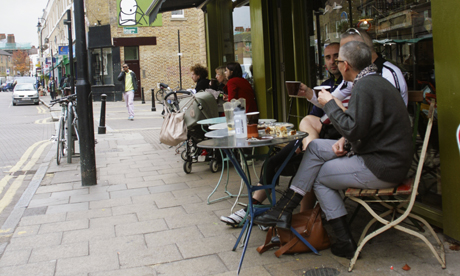Pubs, cafes and markets face massive fee hikes

The increased charges will affect all businesses using street space to trade. Photo: Hackney Citizen
Local businesses and market traders in the borough are facing higher charges in new fee structures outlined by Hackney Council at the end of 2010.
Pubs and cafes, in particular, will be hit with higher charges for having outdoor tables and chairs. Market traders in the borough will face increased fees to set up and trade.
Broadway Market Projects is one of the groups opposing the increases, and director Andrew Veitch says the proposals will hit small businesses the hardest.
“It’s hitting the little guy at a very bad time,” he said. “For the big pubs on Shoreditch High Street it’s not going to matter at all but for the little places here and in Stoke Newington and Green Lanes and Hackney Central it’s a lot of money.”
Opponents of the increased charges have also voiced concern that the council appears to be providing nothing in return for the hikes.
“They’re not going to do anything back, it’s just an outright increase,” said Stephen Selby, chairman of the Broadway Market Traders and Residents Association (BMTRA).
Market traders, for example, say they are still not being provided with electricity, with individual stalls having to provide their own power.
The fee increases are the subject of two separate consultations that run until 18 February for markets and 4 March for shop front traders.
Shop front trading
The most significant rise proposed is to charges for shop front trading, affecting any business that puts chairs, tables or racks of merchandise outside its premises.
Instead of paying a flat fee for outdoor seating and displays, the new shop front trading scheme will charge businesses according to how much space they use. Owners say they currently pay £32.50 per month for shop front trading but this figure could go up to as much as £75.83 per month under the new plans, an increase of 233 per cent.
Stephen Selby criticised the proposal and the effect it will have on local businesses, describing it as “excessive and even antisocial”.
The BMTRA has estimated that pubs and restaurants only make use of their outdoor tables and chairs 75 per cent of the time, which means the actual cost for them is likely to be nearer to £113.75 because of seating that is out of use in bad weather.
Mr Selby argues that outdoor seating provides a non-commercial boost of friendliness to the community as well as more business for local venues.
“Sitting outside bars and pubs has clearly increased the community spirit wherever tables and chairs exist,” he said.
“When we started putting chairs and tables out at Broadway Market a few years ago, suddenly it transformed the entire place.”
He also believes that the proposal may not prove as economically advantageous as the council hopes, since it may reduce the number of people willing to have outdoor seating, thus reducing income.
Elena Sollai, who owns Italian restaurant Su Sazzagoni in Victoria Park Village, has also spoken out against restrictions on outdoor seating. Her restaurant has to stop using its outside tables each day by 8pm, even though the eatery remains open until at least 11pm.
“In July, when the weather was so hot, you can’t imagine how much trade I missed because people wanted to sit outside,” she said. “The restaurant seems closed, because you see the tables outside turned upside down.”
Market trader charges
Market traders may also have to pay more to sell their produce at markets as part of the council’s Market Strategy.
The council, which claims to be subsidising local markets by as much as £1.1million a year, argues that licence fees in Hackney have not changed since 1996 and that the proposed fees are still below the average of other comparable London boroughs.
“In the current economic climate, the council cannot afford to continue this level of subsidy but is committed to supporting markets by keeping fees fair and affordable,” the proposed changes summary said.
It intends to charge “different rates according to the cost of waste disposal and managing each market” and to see fees lower for permanent traders to encourage loyalty from stall holders.
Traders at markets in Hoxton, Ridley Road and Broadway will see their fees almost double. Well Street market and news vendors will also be hit. Some traders have complained that the new charges will cut their profits prohibitively.
Casual traders face a 67 per cent hike in the amount they pay for a single pitch at Broadway Market on a Saturday, for example, with the charge going from £9 to £15. This figure rises still higher for fruit and vegetable vendors, who will face a charge of £17 because of the higher levels of waste they generate.

Can’t feel sorry for the ‘local’ cafes in Broadway Market – how do they think they got their leases in the first place? By the real locals being priced out five years ago.